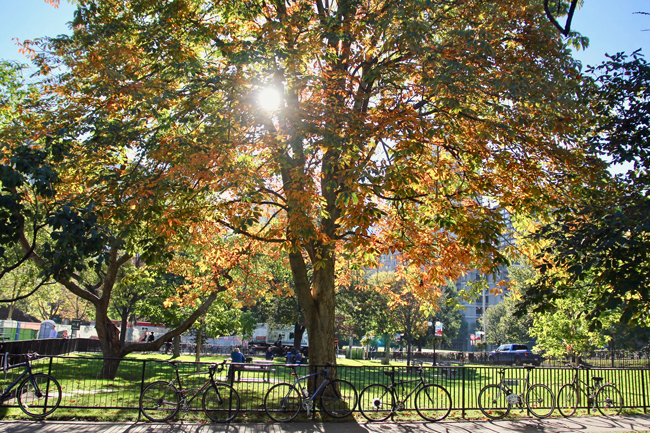
By Caroline Guay
It would not be unusual to walk across McGill’s downtown campus and see students strolling around in shorts and sandals, sunning themselves on Redpath Beach and sipping cold drinks – in August. But to witness this scene in October has many raising their sunglasses and scratching their heads. While it’s tempting to simply enjoy this late blast of summer weather for what it is, many are beginning to wonder whether this is yet another example of the climate gone awry as a result of global warming. Will summers now be longer? Can we expect more dramatic weather events like microbursts, hurricanes and floods? What kind of winter should we anticipate?
The Reporter spoke with Eyad Atallah, Research Associate and Course Lecturer in the Department of Atmospheric and Oceanic Sciences, to find out.
Can we conclude that this unusually warm fall weather is somehow connected to global warming?

I think the natural tendency is that every time that we see an exceptional event is to wonder what exactly is the relationship of this event to climate change. It’s also not exactly the right question to be asking.
There is an analogy that I’d like to make. Let’s say you’re watching a sporting event – a baseball game – and a home run is hit, a really long home run, and you get asked the question “Is that because performance-enhancing drugs are involved?”
That becomes a difficult question because home runs were hit before performance-enhancing drugs were in the game and are hit after they are ostensibly screening for them.
When we talk about changes in a sport or changes in climate, we’re really looking for an amalgamation of events. Attributing individual events to global warming is a really difficult task. What we’re actually asking is “is there a statistical difference in how things are occurring now versus how they used to occur?”
There are basically three questions that we have to ask:
- Is there a physical reason for us to expect climate change to be impacting this particular type of event?
- Can we actually see changes in the statistics of these events in the historical record?
- What do our projections of climate tell us about what we might expect in the future?
It’s really all of those three things together that lead us down the path of whether something is related to climate change or not.
This September, we experienced record-breaking high temperatures in Montreal. To what extent do you predict that average temperatures in Montreal are going to shift?
The no-brainer part of it is that the temperatures are going to increase. That’s basic. We’re already seeing the distribution and the statistics of temperature skewing. If you looked at the top 10 warmest years on record, they would all be within the last 15 or 20 years. If you looked at the temperature of every decade going back to 1980 or so, it’s been higher than the temperature of the previous decade.
What kind of an impact do you think can we expect to see on climate patterns?
There are a few things that we’re starting to subjectively identify that could use a little bit more statistical digging. One thing is that winters start later. That might be related to the fact that we have less sea ice in the fall over the Arctic Ocean. Since it takes the ice longer to build up, it takes cold air masses longer to develop, so everything’s shifted a little bit later into the year.
The other thing is that as the atmosphere warms up, more water is evaporated into to the atmosphere, and so what we’re already seeing is that, in general, the precipitation that we’re getting is occurring in heavier events. It’s not really the fact that we’re changing the frequency of precipitation (we might even be decreasing the frequency a little bit), but when it does rain or snow, it seems to be getting heavier. People might question things like the blizzard that we had last March; how much is due to the increased water vapour that we’re seeing from warmer temperatures, and how related is that blizzard to climate change? Again, individual events are difficult to assess, but these are the kinds of things we may see more frequently.
Can we anticipate that with winter starting later, that would have a ripple effect on the other seasons as well?
We’re noticing that winter is later, and spring is later. Summer tends to be longer. From a subjective sense, people might consider summer extending from June to maybe September now. Instead of September being what we classically considered to be a fall-weather-type month, it might be more of a summer-weather-type month.
The burning question on a lot of people’s lips – what is in store for us this winter?
I do not hold a lot of faith in seasonal-type forecasts. Even when the weather service or Environment Canada issues a seasonal forecast, what they’re really doing is shifting the probabilities a little bit. When they say that the temperature is going to be below normal, what they’re really saying is that instead of a 1 in 3 chance that the temperatures are going to be below normal, it might be a 40 per cent chance that the temperatures are going to be below normal. For most of us, that’s not really a lot of information.
The no-brainer forecast is that temperatures will be warmer than normal, but I would not personally be comfortable trying to predict whether it would be particularly snowy or particularly dry.
